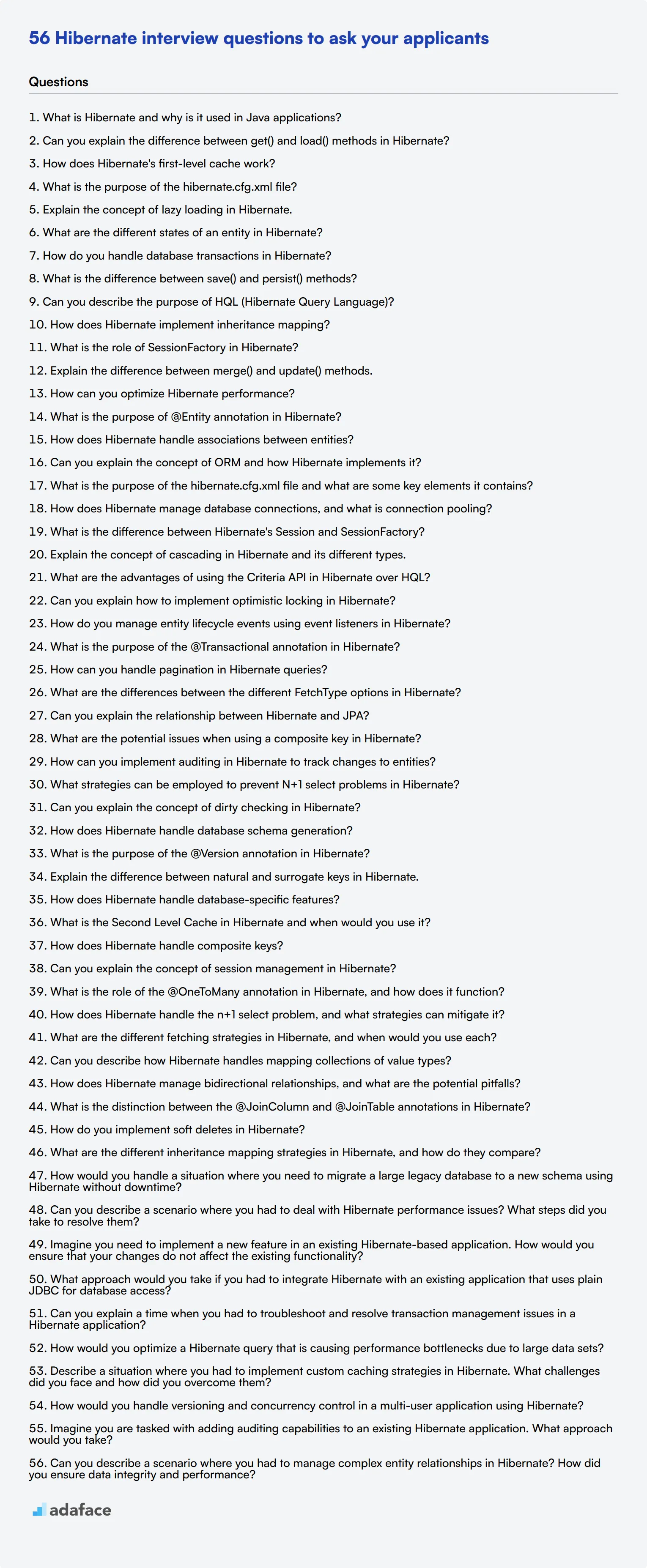Navigating the recruitment process for Hibernate developers can be challenging, especially with the growing demand for proficient candidates. Understanding the skills required for a Java developer can give you a head start in identifying the right questions to ask.
This blog post consolidates various levels of Hibernate interview questions, providing a structured approach to assess candidates from basic to advanced tiers. You'll find questions grouped into categories such as basic concepts, junior roles, mid-tier developers, data persistence, ORM concepts, and situational scenarios.
Using this guide, you can streamline your interview process to identify the most qualified candidates efficiently. Complement your interview strategy by using our Hibernate assessment tests to evaluate your candidates before the interview.
Table of contents
15 basic Hibernate interview questions and answers to assess candidates
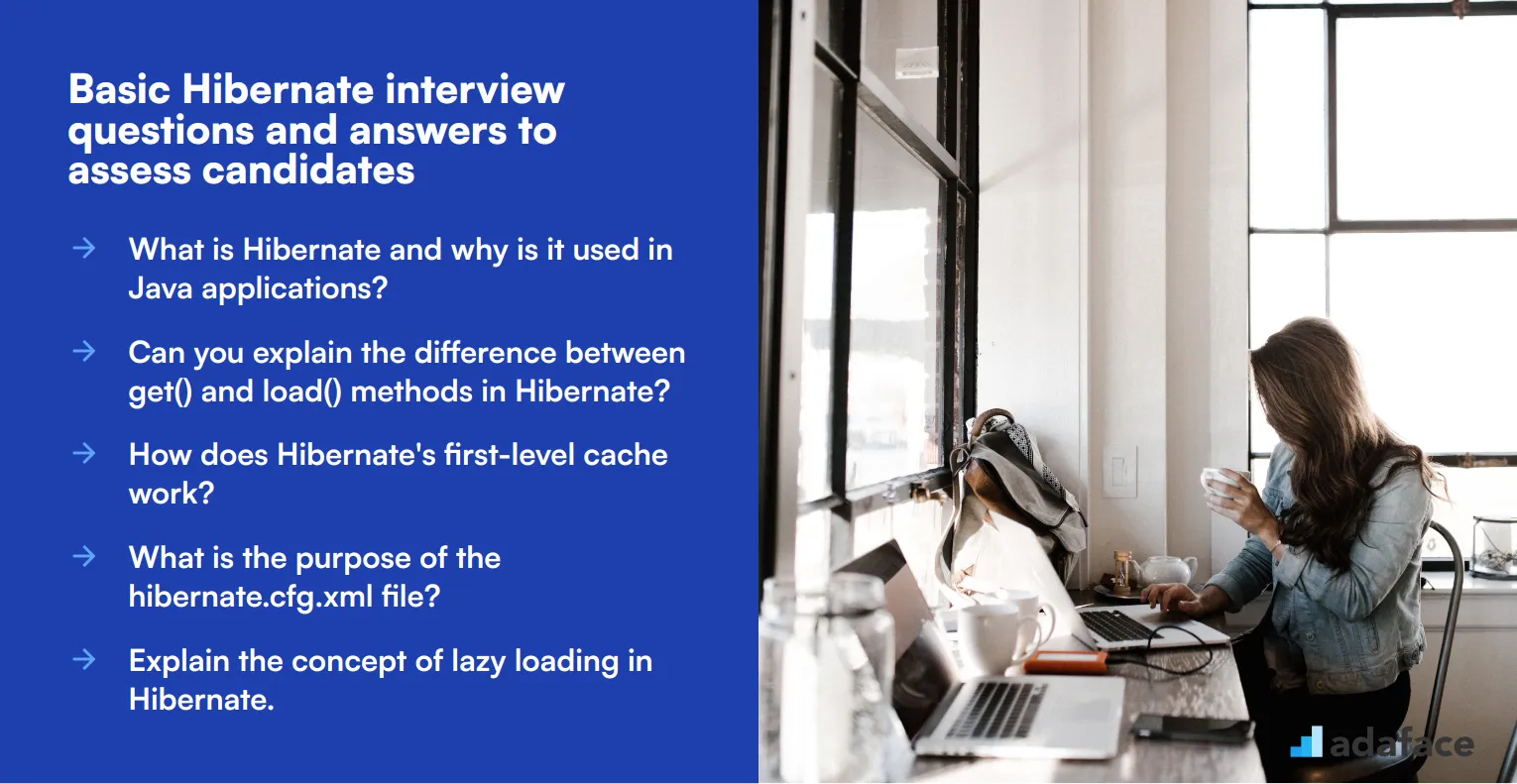
To assess candidates' fundamental understanding of Hibernate, an essential skill for Java developers, use these 15 basic interview questions. These questions will help you gauge a candidate's knowledge of Hibernate's core concepts and their ability to apply them in real-world scenarios.
- What is Hibernate and why is it used in Java applications?
- Can you explain the difference between get() and load() methods in Hibernate?
- How does Hibernate's first-level cache work?
- What is the purpose of the hibernate.cfg.xml file?
- Explain the concept of lazy loading in Hibernate.
- What are the different states of an entity in Hibernate?
- How do you handle database transactions in Hibernate?
- What is the difference between save() and persist() methods?
- Can you describe the purpose of HQL (Hibernate Query Language)?
- How does Hibernate implement inheritance mapping?
- What is the role of SessionFactory in Hibernate?
- Explain the difference between merge() and update() methods.
- How can you optimize Hibernate performance?
- What is the purpose of @Entity annotation in Hibernate?
- How does Hibernate handle associations between entities?
5 Hibernate interview questions and answers to evaluate junior developers
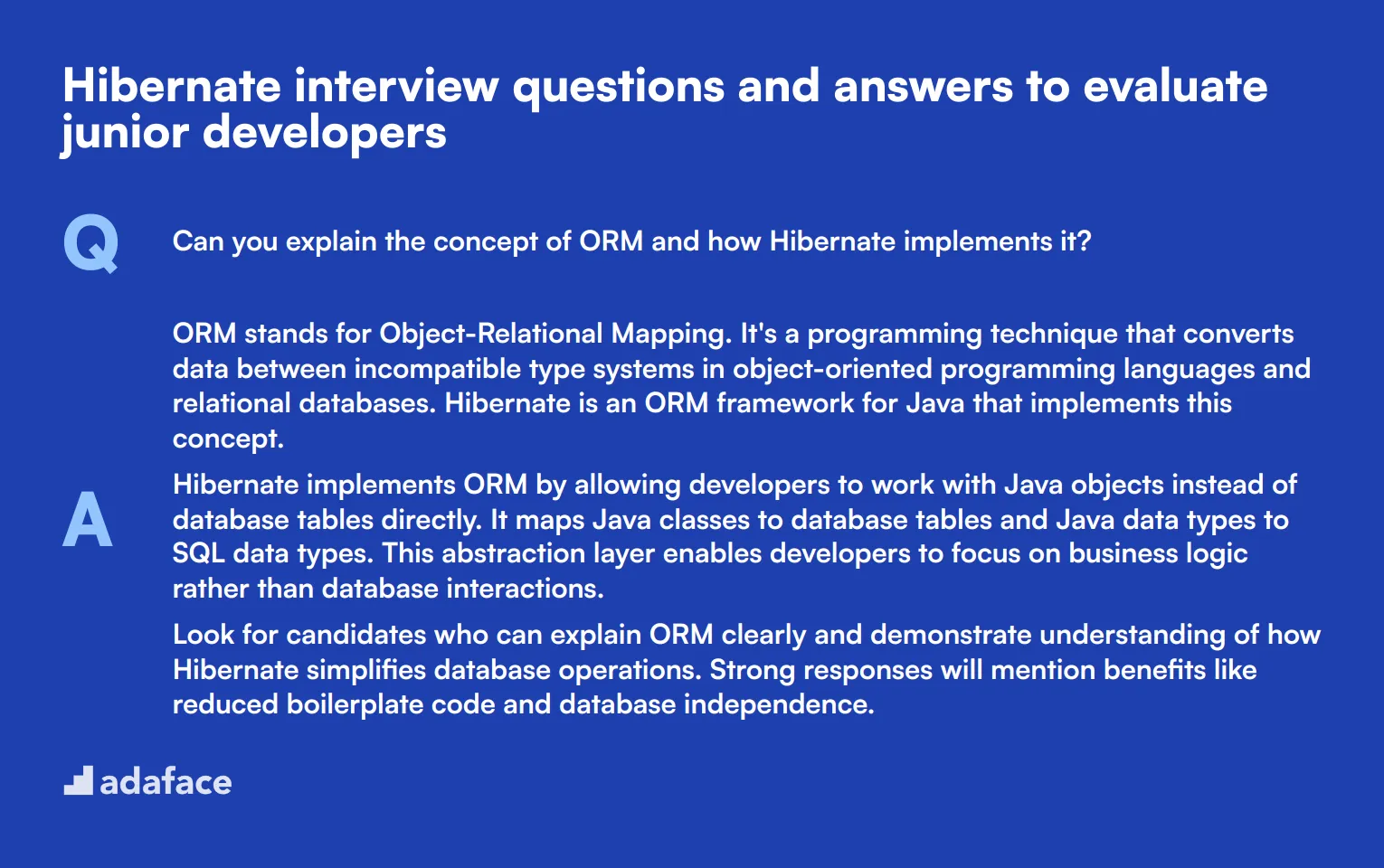
When interviewing junior developers for Hibernate positions, it's crucial to assess their foundational knowledge and practical understanding. This curated list of questions will help you evaluate candidates' grasp of Hibernate basics, enabling you to make informed hiring decisions. Use these questions to gauge a candidate's theoretical knowledge and their ability to apply it in real-world scenarios.
1. Can you explain the concept of ORM and how Hibernate implements it?
ORM stands for Object-Relational Mapping. It's a programming technique that converts data between incompatible type systems in object-oriented programming languages and relational databases. Hibernate is an ORM framework for Java that implements this concept.
Hibernate implements ORM by allowing developers to work with Java objects instead of database tables directly. It maps Java classes to database tables and Java data types to SQL data types. This abstraction layer enables developers to focus on business logic rather than database interactions.
Look for candidates who can explain ORM clearly and demonstrate understanding of how Hibernate simplifies database operations. Strong responses will mention benefits like reduced boilerplate code and database independence.
2. What is the purpose of the hibernate.cfg.xml file and what are some key elements it contains?
The hibernate.cfg.xml file is the main configuration file for Hibernate. Its purpose is to provide essential information for Hibernate to connect to the database and configure its behavior. This file typically contains database connection details, mapping information, and various Hibernate properties.
Key elements in the hibernate.cfg.xml file include:
- Database connection properties (URL, username, password)
- Dialect specification for the database
- Mapping resource declarations
- Cache configurations
- Transaction management settings
Ideal candidates should be able to explain the file's importance and list at least 3-4 key elements. Follow up by asking about specific properties they've used in their projects to gauge practical experience.
3. How does Hibernate manage database connections, and what is connection pooling?
Hibernate manages database connections through a connection provider, which is responsible for creating, managing, and closing database connections. By default, Hibernate uses its built-in connection pool, but it can also integrate with third-party connection pooling solutions like C3P0 or HikariCP.
Connection pooling is a technique used to improve performance by maintaining a cache of database connections that can be reused when future requests to the database are required. Instead of opening and closing a connection for every database operation, which is resource-intensive, connection pooling allows applications to reuse existing connections, significantly reducing overhead.
Look for candidates who can explain both concepts clearly. Strong answers will mention benefits of connection pooling like improved performance and scalability. Consider asking follow-up questions about configuring connection pools or troubleshooting connection issues to assess deeper knowledge.
4. What is the difference between Hibernate's Session and SessionFactory?
SessionFactory is a thread-safe, immutable object that serves as a factory for Session objects. It's typically created once during application initialization and used throughout the application's lifecycle. SessionFactory is responsible for reading the Hibernate configuration, mapping files, and creating Session instances.
Session, on the other hand, is a single-threaded, short-lived object representing a conversation between the application and the database. It wraps a JDBC connection and is used to perform database operations. Sessions are lightweight and should be opened when needed and closed promptly after use.
Candidates should clearly differentiate between the two concepts. Look for mentions of SessionFactory's thread-safety and Session's transient nature. Follow up by asking about best practices for managing Sessions in a web application to assess their practical understanding.
5. Explain the concept of cascading in Hibernate and its different types.
Cascading in Hibernate refers to the automatic propagation of an operation from a parent entity to its associated child entities. When an action is performed on the parent entity, the same action can be automatically applied to its associated entities based on the cascade type specified.
The main cascade types in Hibernate are:
- ALL: Applies all cascade types
- PERSIST: Cascades the save operation
- MERGE: Cascades the merge operation
- REMOVE: Cascades the delete operation
- REFRESH: Cascades the refresh operation
- DETACH: Cascades the detach operation
Look for candidates who can explain the concept clearly and list at least 3-4 cascade types. Strong answers will include examples of when different cascade types are useful. Consider asking about potential pitfalls of cascading to assess critical thinking skills.
10 intermediate Hibernate interview questions and answers to ask mid-tier developers
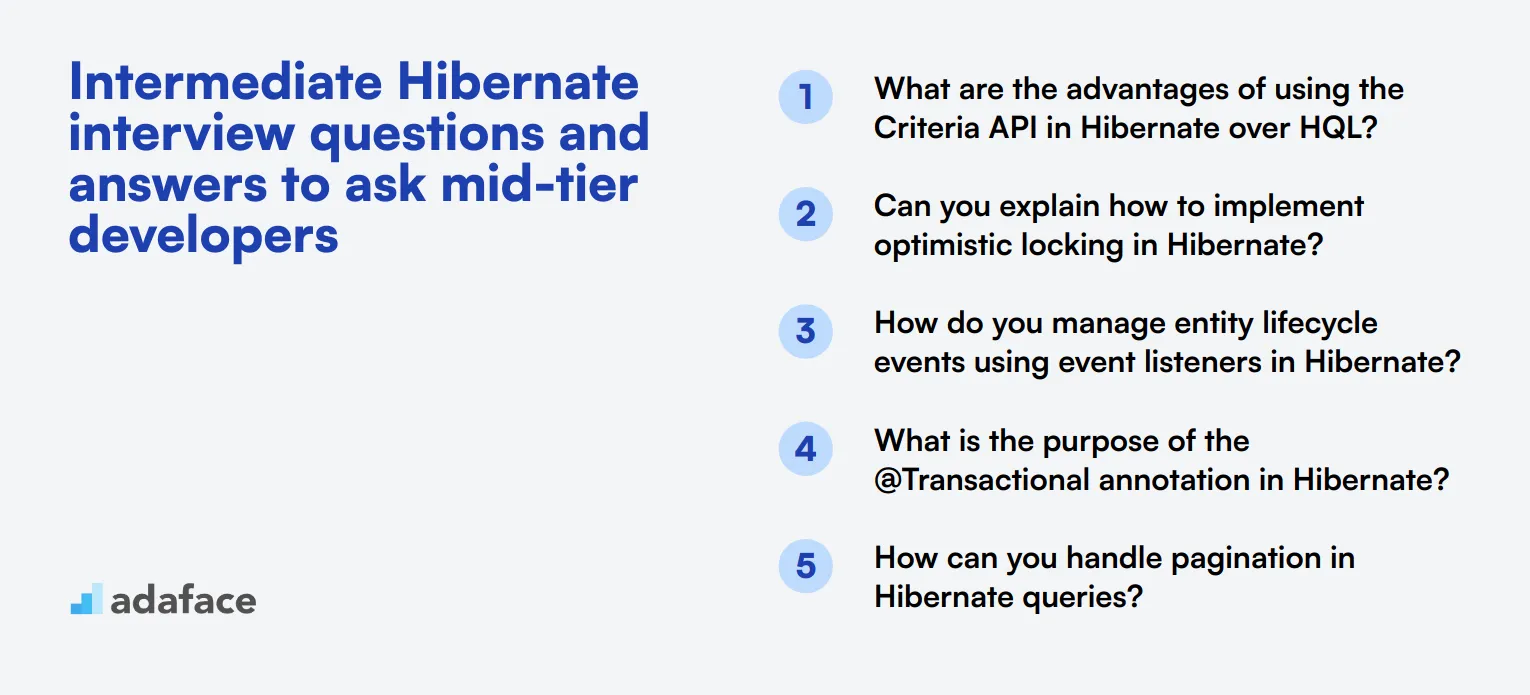
To assess if candidates possess the necessary skills to effectively utilize Hibernate in Java applications, consider asking these intermediate-level questions. This list will help you gauge their technical expertise and practical understanding of Hibernate's features and functionalities, making your interview process smoother and more informative.
- What are the advantages of using the Criteria API in Hibernate over HQL?
- Can you explain how to implement optimistic locking in Hibernate?
- How do you manage entity lifecycle events using event listeners in Hibernate?
- What is the purpose of the @Transactional annotation in Hibernate?
- How can you handle pagination in Hibernate queries?
- What are the differences between the different FetchType options in Hibernate?
- Can you explain the relationship between Hibernate and JPA?
- What are the potential issues when using a composite key in Hibernate?
- How can you implement auditing in Hibernate to track changes to entities?
- What strategies can be employed to prevent N+1 select problems in Hibernate?
7 Hibernate interview questions and answers related to data persistence
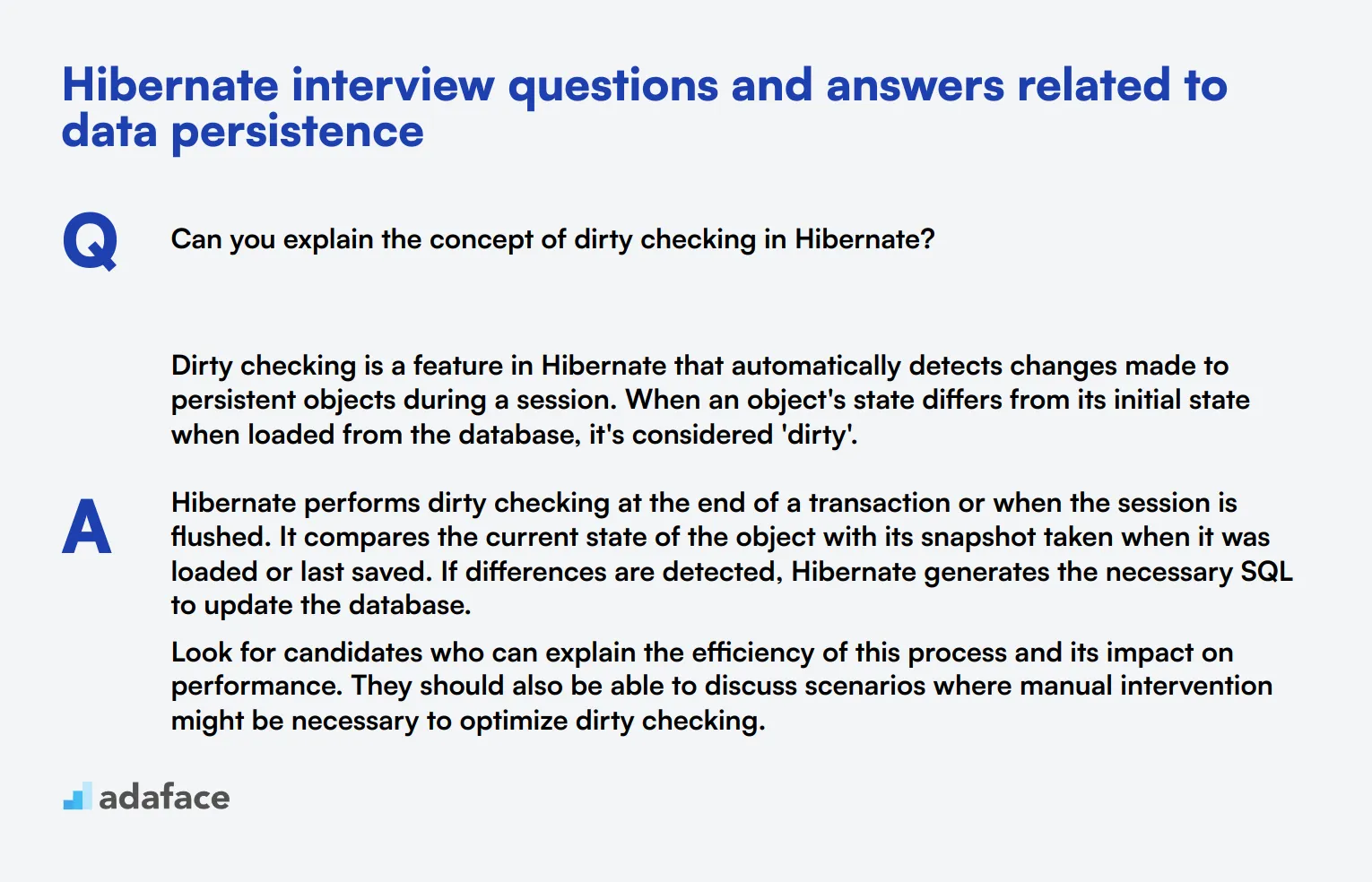
Ready to dive into the world of Hibernate data persistence? These seven questions will help you gauge a candidate's understanding of this crucial aspect of Java development. Whether you're a seasoned recruiter or just dipping your toes into technical hiring, this list will help you separate the Hibernate experts from the novices. Remember, the goal is to spark a conversation, not to trip up your candidates!
1. Can you explain the concept of dirty checking in Hibernate?
Dirty checking is a feature in Hibernate that automatically detects changes made to persistent objects during a session. When an object's state differs from its initial state when loaded from the database, it's considered 'dirty'.
Hibernate performs dirty checking at the end of a transaction or when the session is flushed. It compares the current state of the object with its snapshot taken when it was loaded or last saved. If differences are detected, Hibernate generates the necessary SQL to update the database.
Look for candidates who can explain the efficiency of this process and its impact on performance. They should also be able to discuss scenarios where manual intervention might be necessary to optimize dirty checking.
2. How does Hibernate handle database schema generation?
Hibernate provides several options for database schema generation. The most common approaches include:
- Using the hibernate.hbm2ddl.auto property in the configuration file
- Utilizing SchemaExport tool for more control
- Employing JPA's schema generation features
A strong candidate should be able to explain the different values for hibernate.hbm2ddl.auto (like create, update, validate) and their implications. They should also discuss the pros and cons of automatic schema generation versus manual schema management, especially in production environments. Look for awareness of database developer best practices in their response.
3. What is the purpose of the @Version annotation in Hibernate?
The @Version annotation in Hibernate is used for optimistic locking. It helps prevent concurrent modifications to the same entity by different transactions.
When an entity is annotated with @Version, Hibernate automatically increments the version number when the entity is updated. During an update operation, Hibernate checks if the version in the database matches the version of the entity being updated. If they don't match, it means another transaction has modified the entity, and Hibernate throws an OptimisticLockException.
Evaluate the candidate's understanding of concurrency issues and how @Version helps mitigate them. They should also be able to discuss scenarios where optimistic locking is beneficial and potential drawbacks.
4. Explain the difference between natural and surrogate keys in Hibernate.
Natural keys are identifiers that have a business meaning and exist in the real world. For example, a social security number or an email address. Surrogate keys, on the other hand, are artificial identifiers typically generated by the database or application, like an auto-incrementing integer.
In Hibernate, both types can be used as primary keys. Natural keys are often implemented using @NaturalId annotation, while surrogate keys typically use @Id with a generation strategy.
Look for candidates who can discuss the pros and cons of each approach. They should mention factors like performance, maintainability, and data integrity. A good answer might also touch on how the choice between natural and surrogate keys can affect the overall database design and application architecture.
5. How does Hibernate handle database-specific features?
Hibernate provides several mechanisms to handle database-specific features:
- Dialect classes: Hibernate uses dialect classes to generate database-specific SQL.
- Native SQL: Allows writing raw SQL queries for database-specific operations.
- Custom types: Enables mapping between Java types and database-specific data types.
- Interceptors: Can be used to modify SQL before it's sent to the database.
A strong candidate should be able to explain when and why you might need to use these features. They should also discuss the trade-offs between using database-specific features and maintaining database independence. Look for awareness of how this impacts application portability and maintenance.
6. What is the Second Level Cache in Hibernate and when would you use it?
The Second Level Cache in Hibernate is a session-independent cache that stores entity data. Unlike the first-level cache which is tied to a specific session, the second-level cache is shared across sessions and can significantly improve performance by reducing database hits.
It's particularly useful for:
- Frequently accessed, rarely changing data
- Read-heavy applications
- Scenarios where data consistency across sessions is important
Evaluate the candidate's understanding of caching strategies and their impact on application performance. They should be able to discuss different cache providers (like EHCache), cache regions, and cache concurrency strategies. Look for awareness of potential pitfalls, such as stale data issues, and how to mitigate them.
7. How does Hibernate handle composite keys?
Hibernate supports composite keys through the @EmbeddedId and @IdClass annotations. @EmbeddedId uses an embeddable class to represent the composite key, while @IdClass uses a separate class that mirrors the primary key fields in the entity.
When using composite keys, it's important to implement equals() and hashCode() methods correctly in the key class. Hibernate uses these methods for identity comparison and efficient retrieval from collections.
Look for candidates who can explain the pros and cons of using composite keys versus single surrogate keys. They should be able to discuss scenarios where composite keys are appropriate and potential challenges in mapping and querying entities with composite keys. A good answer might also touch on how composite keys affect Java development practices and object-relational mapping strategies.
9 Hibernate questions related to ORM concepts
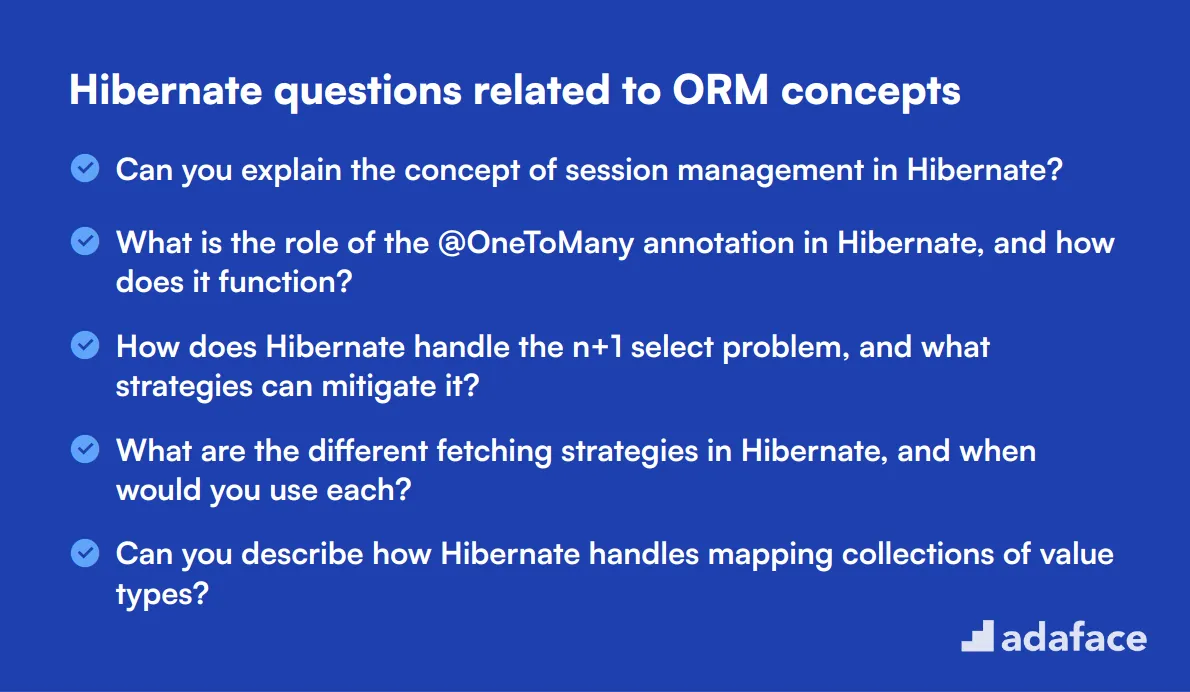
To assess whether candidates have a solid grasp of ORM concepts using Hibernate, consider asking some of these key questions during interviews. These questions are designed to uncover both theoretical knowledge and practical experience, crucial for roles detailed in this Java Developer job description.
- Can you explain the concept of session management in Hibernate?
- What is the role of the @OneToMany annotation in Hibernate, and how does it function?
- How does Hibernate handle the n+1 select problem, and what strategies can mitigate it?
- What are the different fetching strategies in Hibernate, and when would you use each?
- Can you describe how Hibernate handles mapping collections of value types?
- How does Hibernate manage bidirectional relationships, and what are the potential pitfalls?
- What is the distinction between the @JoinColumn and @JoinTable annotations in Hibernate?
- How do you implement soft deletes in Hibernate?
- What are the different inheritance mapping strategies in Hibernate, and how do they compare?
10 situational Hibernate interview questions for hiring top developers
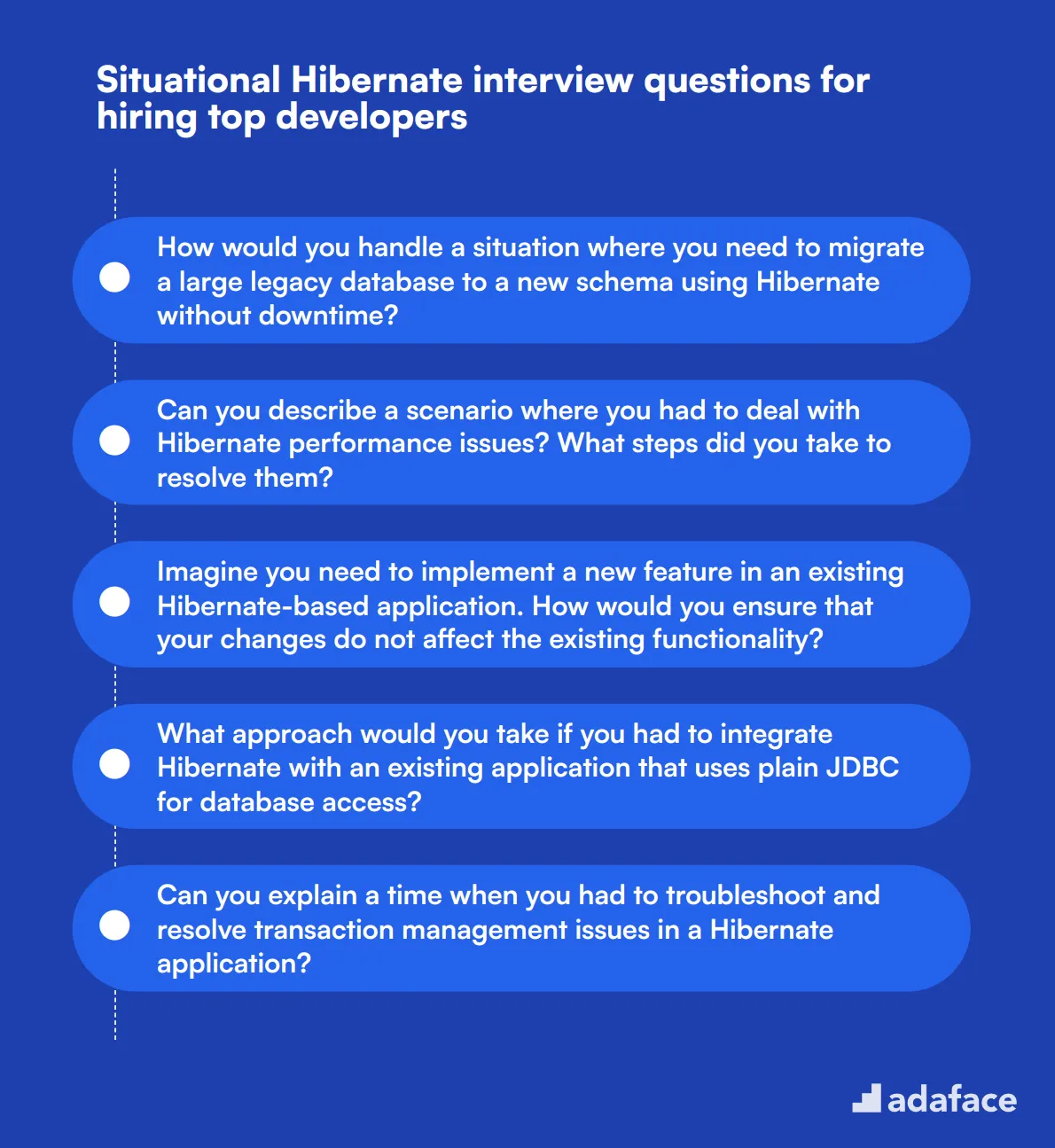
To assess whether candidates have the practical skills needed for complex tasks in Hibernate, use these 10 situational questions. These questions will help you determine if applicants can apply their Hibernate knowledge effectively in real-world scenarios. For more information on relevant roles, check out the software developer job description.
- How would you handle a situation where you need to migrate a large legacy database to a new schema using Hibernate without downtime?
- Can you describe a scenario where you had to deal with Hibernate performance issues? What steps did you take to resolve them?
- Imagine you need to implement a new feature in an existing Hibernate-based application. How would you ensure that your changes do not affect the existing functionality?
- What approach would you take if you had to integrate Hibernate with an existing application that uses plain JDBC for database access?
- Can you explain a time when you had to troubleshoot and resolve transaction management issues in a Hibernate application?
- How would you optimize a Hibernate query that is causing performance bottlenecks due to large data sets?
- Describe a situation where you had to implement custom caching strategies in Hibernate. What challenges did you face and how did you overcome them?
- How would you handle versioning and concurrency control in a multi-user application using Hibernate?
- Imagine you are tasked with adding auditing capabilities to an existing Hibernate application. What approach would you take?
- Can you describe a scenario where you had to manage complex entity relationships in Hibernate? How did you ensure data integrity and performance?
Which Hibernate skills should you evaluate during the interview phase?
Assessing a candidate's Hibernate skills cannot be fully accomplished in a single interview. However, by focusing on a core set of skills, you can get a solid understanding of their capabilities and ensure they meet your needs. Here are the essential Hibernate skills you should evaluate during the interview phase:
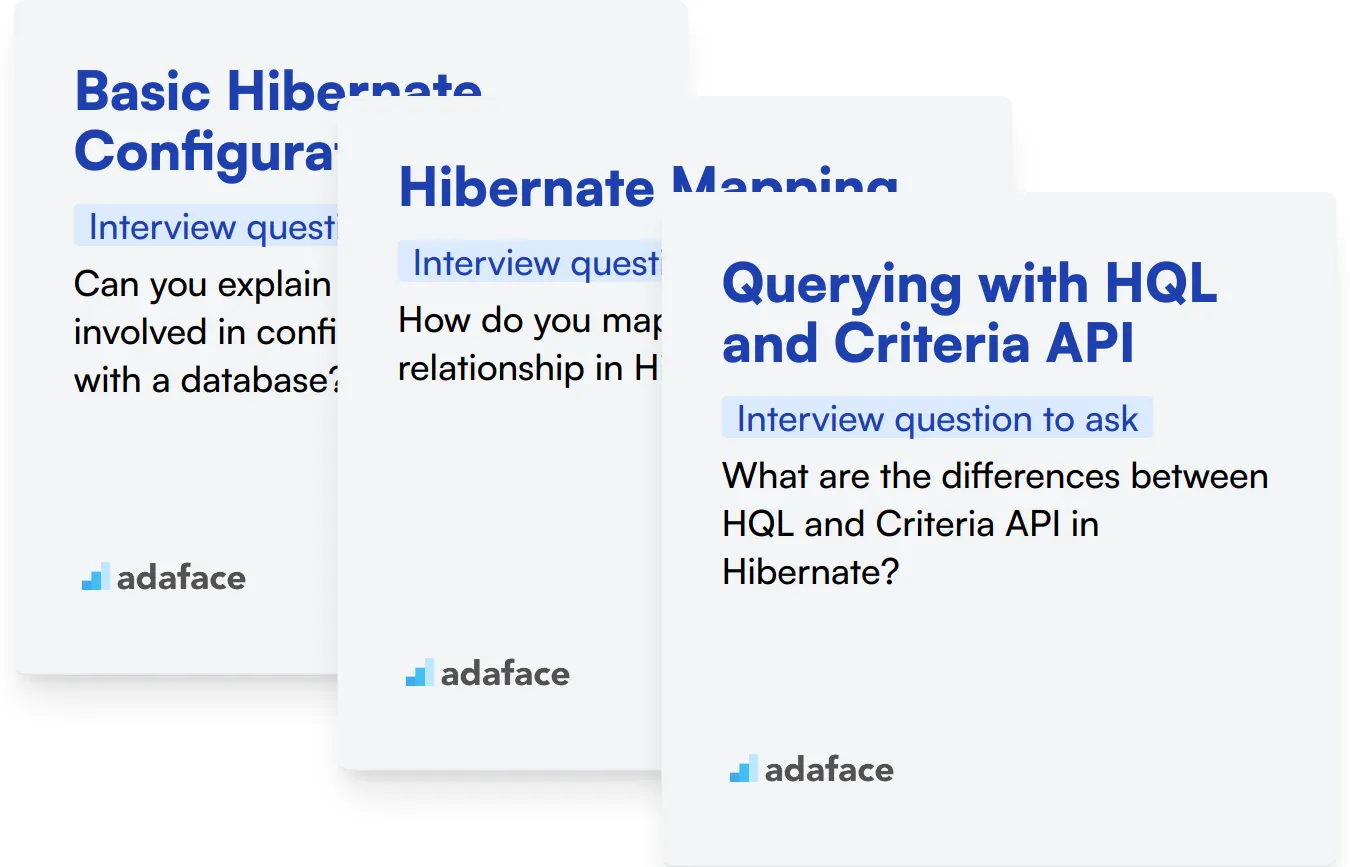
Basic Hibernate Configuration
You can use an assessment test that includes relevant MCQs to check their knowledge of basic Hibernate configuration. Consider using Adaface's Hibernate test for this purpose.
During the interview, ask targeted questions specifically designed to gauge their understanding of Hibernate configuration.
Can you explain the steps involved in configuring Hibernate with a database?
Look for a clear explanation of steps including setting up the Hibernate configuration file, adding database connection details, and mapping classes. The candidate should also mention potential pitfalls and how to avoid them.
Hibernate Mapping
You can utilize an assessment test asking relevant MCQs to filter out this skill. Adaface's Hibernate test includes questions on Hibernate mapping.
Ask specific interview questions to evaluate their understanding of mapping strategies and techniques in Hibernate.
How do you map a one-to-many relationship in Hibernate?
Expect a detailed response mentioning the use of the @OneToMany and @JoinColumn annotations. The candidate should explain the importance of cascading and fetching strategies in this context.
Querying with HQL and Criteria API
An assessment test with focused MCQs can help you evaluate this skill. Adaface's Hibernate test includes questions on HQL and Criteria API.
Ask interview questions that specifically focus on querying techniques using HQL and the Criteria API.
What are the differences between HQL and Criteria API in Hibernate?
Look for an answer that mentions the syntactical differences, use cases, and advantages of each querying method. The candidate should also discuss scenarios where one is preferred over the other.
Optimizing Hibernate Interview Strategies
As you prepare to deploy the insights from this post, here are three key tips to ensure you use Hibernate interview questions effectively.
1. Incorporate Skill Tests Prior to Interviews
Before you dive into interviewing, initiate the process with skill tests to screen candidates efficiently. This approach filters out unsuitable applicants early, ensuring you engage only those with proven competencies.
For Hibernate roles, consider utilizing Hibernate Test to assess fundamental Hibernate skills, or opt for a Java Spring Hibernate Test for a more comprehensive evaluation. This prevents potential mismatches and enhances the quality of your candidate pool.
Skill assessments not only save time by narrowing down your list of candidates but also provide objective data to back your interview discussions. Transition smoothly into interviews with a clearer picture of each candidate’s technical expertise.
2. Strategically Select and Compile Interview Questions
The limited time in interviews demands strategic question selection to maximize the assessment’s effectiveness. Focus on crafting a set of questions that covers essential Hibernate skills and intersects with key job requirements.
While preparing, consider weaving in questions from related technologies that are pivotal for the role. For instance, enrich your Hibernate interview by including questions from the Java Online Test or explore broader database knowledge with SQL Online Test. This ensures a holistic evaluation of candidate capabilities.
Ensure your questions are not only technically comprehensive but also tailored to gauge how well candidates fit into the team and adapt to your company's culture, leveraging insights from topics like communication skills.
3. Emphasize Follow-Up Questions in Interviews
Going beyond the surface-level answers with follow-up questions is essential to uncover the candidate's in-depth knowledge and adaptability to complex situations.
For example, after a candidate explains their approach to optimizing a Hibernate session, you might follow up with, 'Can you describe a scenario where your chosen optimization technique was particularly effective, and why?' This encourages candidates to demonstrate practical understanding and real-world application, essential for gauging depth and fit for the role.
Using Hibernate Skills Tests to Streamline Your Hiring Process
When hiring for roles requiring Hibernate expertise, verifying these skills is key. An effective way to assess candidates accurately is through targeted skills tests. Consider exploring our Hibernate Test or Java Spring Hibernate Test for precise evaluation.
After implementing these tests, you can efficiently shortlist the top candidates for interviews. To further streamline your hiring process, sign up on our platform via this link, where you can access more specialized tests and resources.
Hibernate Online Test
Download Hibernate interview questions template in multiple formats
Hibernate Interview Questions FAQs
The post covers basic, junior, intermediate, data persistence, ORM concepts, and situational Hibernate interview questions.
These questions can help assess candidates' Hibernate knowledge and skills at different experience levels, from junior to advanced developers.
Yes, the post includes sections on optimizing Hibernate interview strategies and using skills tests to streamline the hiring process.
The post provides 15 basic, 8 junior, 12 intermediate, 7 data persistence, 9 ORM concept, and 10 situational Hibernate interview questions.

40 min skill tests.
No trick questions.
Accurate shortlisting.
We make it easy for you to find the best candidates in your pipeline with a 40 min skills test.
Try for freeRelated posts
Free resources




